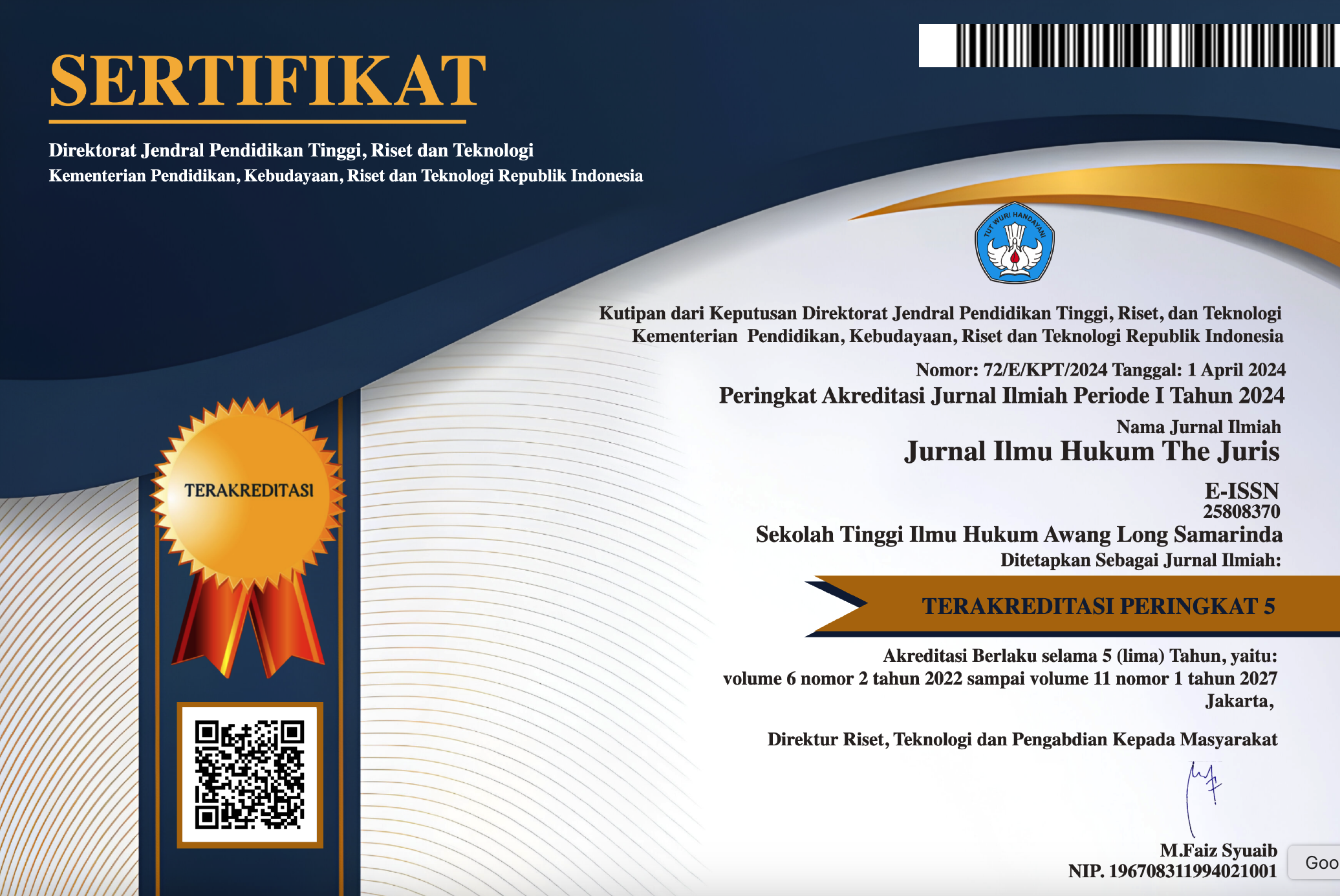PERTIMBANGAN HAKIM DALAM MENJATUHKAN PUTUSAN PIDANA TERHADAP PELAKU PENCURIAN YANG MENDERITA KLEPTOMANIA
Abstract
This research aims to analyze the judge's considerations regarding criminal acts of theft committed by kleptomania sufferers. This research also aims to examine the application of material criminal law by judges in handing down decisions and sentences against perpetrators of theft who suffer from kleptomania in Decision Number 32/Pid.B/2018/PN Kpg. This research uses a normative method with a statutory approach and a case approach. Primary and secondary legal materials are used as legal sources. The data collection technique was carried out by collecting data from various literature sources relevant to the research. The legal issue in this research is the existence of legal uncertainty in the application of Article 44 of the Criminal Code relating to perpetrators of criminal acts of theft who suffer from kleptomania, as in the case of Decision No32/Pid.B/2018 /PN Kpg above, it was explained that the defendant Maudy Susana Tefnai had a habit of stealing (Kleptomania), for which the defendant Maudy had to undergo criminal probation for 1 year. This is contrary to the Reason for Forgiveness, which states that whoever commits an act that cannot be accounted for because his or her intellectual powers (zijner verstandelijke vermogens) are disabled in growth or impaired due to disease, is not punished. From the trial process in this case, the responsibility of criminals suffering from kleptomania can be analyzed based on monistic and dualistic currents.
Downloads
References
Ariman, M. R. (2008). Kejahatan Tertentu dalam KUHP (Sari Kuliah Hukum Pidana Dalam Kodifikasi. Unsri.
Dendy Sugono. (2008). Kamus Bahasa Indonesia (XVI, Issue september 2016). PUSAT BAHASA DEPARTEMEN PENDIDIKAN NASIONAL.
Dr. H. M. Hamdan, SH., M. (2012). Alasan Penghapus Pidana Teori dan studi kasus. PT Refika Aditama.
Dr. M. Haryanto, SH., M.Hum. & Dr. Christina Maya Indah S., SH., M.Hum, Hukum Pidana, Griya Media, Salatiga, 2018.
Huda Chairul. (n.d.). Dari Tiada Pidana Tanpa Kesalahan Menuju Kepada Tiada Pertanggungjawaban Pidana Tanpa Kesalahan (3rd ed.). Kencana,2008.
James Dever. (2010). Kamus Psikologi (2nd ed.). Bina Aksara, 1998.
Prof. Dr. Andi Sofyan, S.H., M. H., & Dr. Hj. Nur Azisa, S.H., M. H. (2020). Buku Ajar Hukum Pidana. In Kadarudin (Ed.), Buku Ajar Hukum Pidana. Pustaka Pena Press. https://doi.org/10.21070/2020/978-623-6833-81-0
Remmelink, J. (2009). Hukum Pidana: Komentar atas pasal-pasal terpenting dari Kitab Undang-undang Hukum Pidana Belanda dan padanannya dalam kitab Undang-undang Hukum Pidana Indonesia. PT Gramedia Pustaka Utama, 2003.
Saleh, R. (n.d.). Pikiran-pikiran tentang pertanggungan jawab pidana. Ghalia Indonesia, 1982.
Wahyuni, D. F. (2017). Dasar-Dasar Hukum Pidana Indonesia. In M Rizqi Azmi (Ed.), Perpustakaan Nasional. PT Nusantara Persada Utama, 2017. https://jdih.situbondokab.go.id/barang/buku/Dasar-Dasar Hukum Pidana di Indonesia by Dr. Fitri Wahyuni., S.H., M.H. %28z-lib.org%29.pdf
Yelvi Levani, Aldo Dwi Prastya, S. N. R. (2019). KLEPTOMANIA: MANIFESTASI KLINIS DAN PILIHAN TERAPI. Magna Medika, 6(1), 31–37. https://doi.org/https://doi.org/10.26714/magnamed.6.1.2019.31-37
Copyright (c) 2024 Andreas Septiadi Widagdo, Muh Haryanto

This work is licensed under a Creative Commons Attribution-ShareAlike 4.0 International License.







